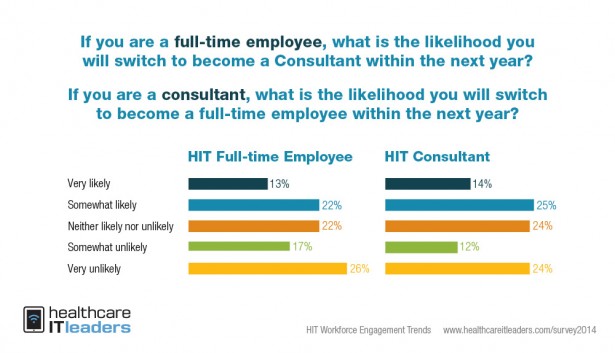5 Reasons Why Healthcare IT Workers Switch Jobs
 Nearly half of IT employees at a hospital would like to work for their current employer until retirement, according to a 2013 Towers-Watson survey.
Nearly half of IT employees at a hospital would like to work for their current employer until retirement, according to a 2013 Towers-Watson survey.
But the reality of today's HIT job market is one of greater volatility, with most HIT workers open to new opportunities under certain circumstances.
In our own survey of HIT full-time employees, only 12% said they were completely satisfied with their present job and would not currently consider a new one. Among our respondents, 24% said they were actively looking for a new job, 32% said they were occasionally looking, and 32% said they were not looking, but were open to a new job.
What would make a healthcare IT professional switch jobs? Hiring managers may not want to hear this, but the most common answer is “more money.” Our respondents’ top five reasons for considering a job switch are below:
- Better compensation (74%)
- Opportunities for advancement (56%)
- Improved work/life balance (44%)
- More learning opportunities (36%)
- Better benefits (35%)
The attraction of higher pay may lure some employees into consulting careers. We asked FTEs if they were considering a switch to become a consultant within the next year, and 13% said it was very likely that they would switch to consulting, while 22% said it was somewhat likely.
Implications for Employers
For hiring managers charged with recruitment and retention, it’s important to appreciate the focus that HIT employees have on practical requirements, such as compensation and advancement opportunities. Unfortunately, employers and their employees seem to have starkly different views on what makes a job attractive.
In the Towers-Watson survey, employers surprisingly ranked "base salary" as eighth on the overall list of draws for employees. Hiring managers felt factors such as challenging work and the employer's reputation were their best recruiting tools.
Healthcare employers with deep-rooted misconceptions about what employees value will find it harder to hire and retain critical IT talent, said researchers.
For more on healthcare IT workforce engagement trends, download our free report.
